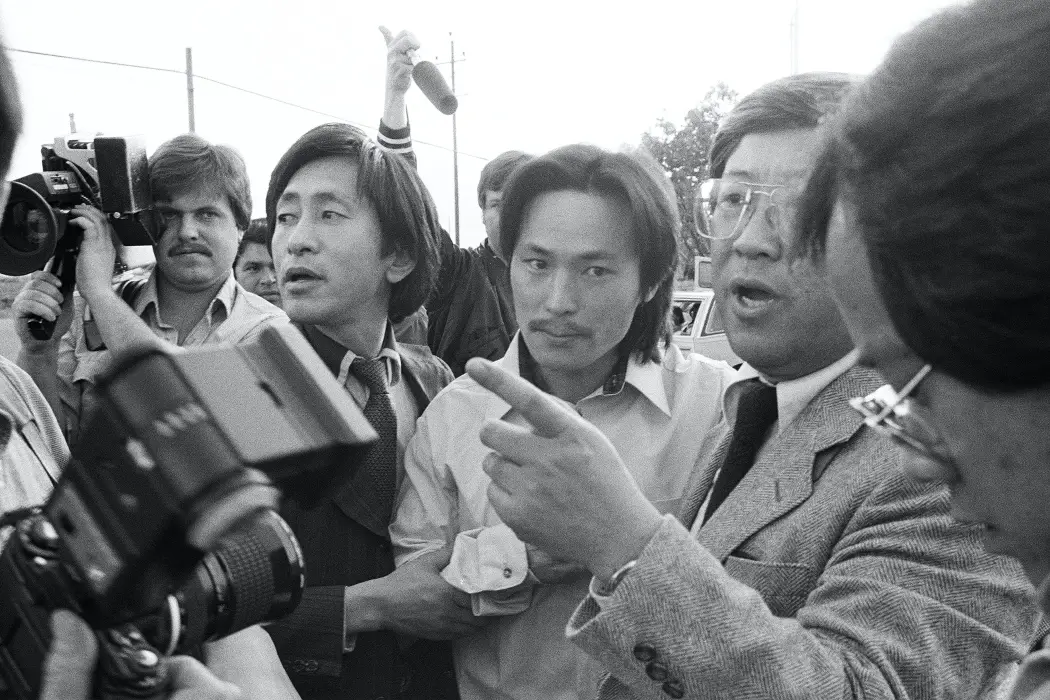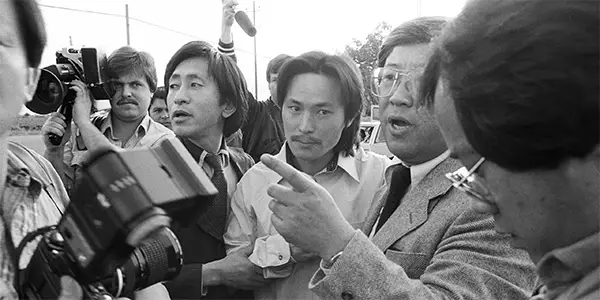Sundance Film Festival 2022: FREE CHOL SOO LEE: A Stirring Look At Racism And Injustice

Therese Lacson is a writer and editor. She is a…
What does it mean to be an outsider? In many ways, Free Chol Soo Lee investigates this question through its 83-minute runtime. The documentary by first-time documentarians Julie Ha and Eugene Yi tells the story of Chol Soo Lee, a 20-year-old Korean immigrant who was falsely accused of murder and sent to prison. What came out of his conviction was a movement that brought together a community. But it also brings to light the injustice of the American justice system toward outsiders – toward immigrants, toward non-white faces, toward foreigners.
A Failed System
Free Chol Soo Lee details the complicated journey of Chol Soo Lee’s life. From his rough childhood in South Korea after being abandoned by his abusive mother to his move to San Francisco where he lived in Chinatown and stood out as the only Korean guy in the neighborhood. Then, on June 3, 1973, a Chinese man named Yip Yee Tak is murdered, a victim of the gang war between the Wah Ching and the Joe Boys, infamous gangs in Chinatown.
Instead of pursuing the real suspect, the police decide to pin it on Chol Soo, who had a couple of petty crimes on his record. Ensnared by the justice system, suddenly Chol Soo is being pointed out by eyewitnesses (later revealed all to be white) and is thrown into prison with a conviction of first-degree murder. His story reaches the eyes of the intrepid investigative reporter K.W. Lee. Much of the heart of the documentary hinges on Chol Soo’s relationship with K.W., who acts as a father to him. K.W., in turn, sees in Chol Soo a mirror: a man who holds the fate that easily could have been his.
The height of hope in the documentary centers around the community that rises up around Chol Soo and the people who rally for justice. K.W. is able to bring his case to light within the small Korean community, but it wasn’t just Korean immigrants and Korean Americans who were standing up and fighting for Chol Soo, the entire Asian community rose up to help. The documentary doesn’t linger on this, but it’s important to point out how big of a deal this is – Asians are not a monolith and they are prideful of their nationality.
China is not Japan is not Korea is not Vietnam. People are different and when you live in a country that paints you all as the same, you can strive to stand out. But the community comes together, recognizing a gross miscarriage of justice, recognizing the systemic racism of that justice system, and comes to defend Chol Soo.
Freedom That Doesn’t Feel Free
But where there are peaks there are also valleys. And while I won’t go into detail about Chol Soo’s entire life, he eventually does make it out of prison. However, his freedom no longer feels free. Having spent a decade in prison and nearly half of that on death row, his life is forever altered. Even amongst his community, he is an outsider. He was a symbol of the movement, and burdened with the pressure of that responsibility, he faltered.

Free Chol Soo Lee is, in many ways, a tragedy. While some measure of justice was found in Chol Soo being freed, his life was destroyed by the system that saw him as just another yellow face, just another Asian, probably involved with the gangs. Ha and Yi highlight this extremely well, showing that even after the community’s success, there is still more work to do. There is no better example for this than the film that came out based on Chol Soo’s experience in 1989 titled True Believer.
It stars James Woods and Robert Downey Jr. as the hard-working attorneys who get Shu Kai Kim, a young Korean man, out of prison for wrongful murder. Aside from the fact that Shu Kai is most definitely not a Korean name, the character is played by Yuji Okumoto, a Japanese actor. The film centers the entire story around the story of two white men when the work of Chol Soo’s trial was defended by primarily Asian lawyers. Ten years later and Asians are still interchangeable in the eyes of America.
While it’s hard to find a flaw in Free Chol Soo Lee, as an Asian American myself Chol Soo’s story hits too close to home to be truly subjective, there is a contemporary angle that Ha and Yi missed out on. Pointing out how Chol Soo’s story of misidentification can be related to the attacks on Asian elders during a time of COVID might have been a timely comparison, or perhaps highlighting the Korean community’s growth and visibility today as South Korean media and culture begin to permeate into mainstream American culture. Or even mentioning the fate of the death of Yip Yee Tak, the man who was brutally killed on the streets of Chinatown, a death that seemingly has no justice.
Conclusion
Free Chol Soo Lee tackles many subjects, the justice system, the Asian American community, the burden of representation, but the way that it puts Chol Soo’s story and his tragedies front and center is exceedingly effective. It’s impossible not to connect Chol Soo Lee’s life and the path he took with the injustice he experienced at the age of 20. How, even after he was freed, he still felt like an outsider looking in, overwhelmed with pressure and traumatized by prison. Chol Soo’s story should be a cautionary tale but one that we all are familiar with and learn from; it should stand as a pillar of Asian American history not forgotten to the past.
What did you think of Free Chol Soo Lee? Let us know in the comments below.
Free Chol Soo Lee premiered at the Sundance Film Festival on January 21, 2022. It is currently seeking US distribution.
Does content like this matter to you?
Become a Member and support film journalism. Unlock access to all of Film Inquiry`s great articles. Join a community of like-minded readers who are passionate about cinema - get access to our private members Network, give back to independent filmmakers, and more.
Therese Lacson is a writer and editor. She is a features editor at Collider, the entertainment editor of Comics Beat, and the co-founding editor of Nerdophiles.










